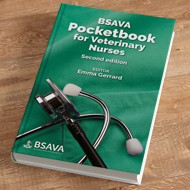
Second edition adds new information and tools to support nurses.
The BSAVA has released a new, updated version of its Pocketbook for Veterinary Nurses, which aims to provide essential information, guidance and practical advice in an easily accessible format.
The BSAVA have built upon the work of Louise O’Dwyer, who edited the first edition, to produce a more up-to-date, in-depth version which reflects the expanding responsibilities of the veterinary nursing profession.
This second edition is edited by Emma Gerrard; a BSAVA Committee member and recently elected chair of Cymru/Wales region.
The book contains key information from a range of BSAVA titles, including the BSAVA Textbook of Veterinary Nursing, with extra sections written by Ms Gerrard and external sources.
Notable additions to the updated Pocketbook include:
- surgical and anaesthetic checklists
- pain scales for dogs, cats and rabbits
- dental recording charts
- PROTECT ME information on antimicrobial resistance.
It features multiple helpful illustrations and tools and sections are arranged alphabetically, with cross-references for ease of use.
Ian Ramsey, BSAVA president for the years 2020 – 2021, said: “Animals are more likely to get better, and get better faster, if they have good nursing care.
“This book is packed with the sort of information that allows nurses to deliver that care. It is presented in a format that makes it easy to carry around, but it will find its home at the heart of the clinic.”
The BSAVA Pocketbook for Veterinary Nurses, 2nd edition is now available from the BSAVA website.
Images (c) BSAVA.



 The latest
The latest